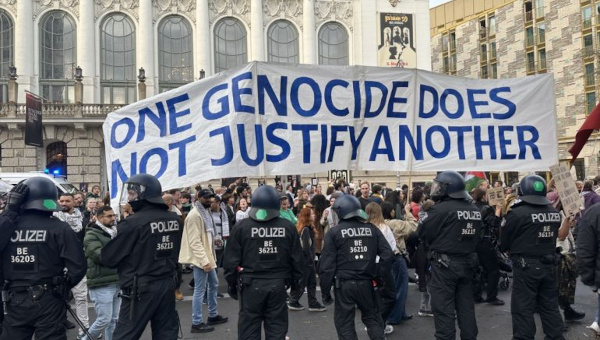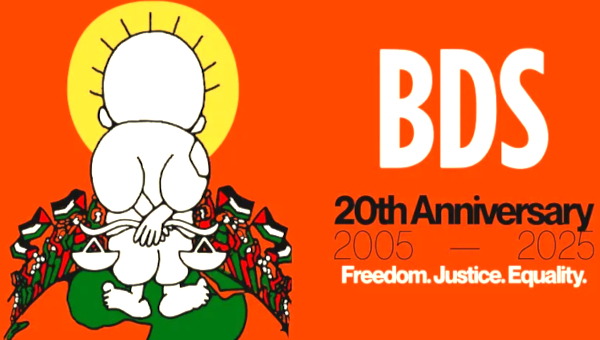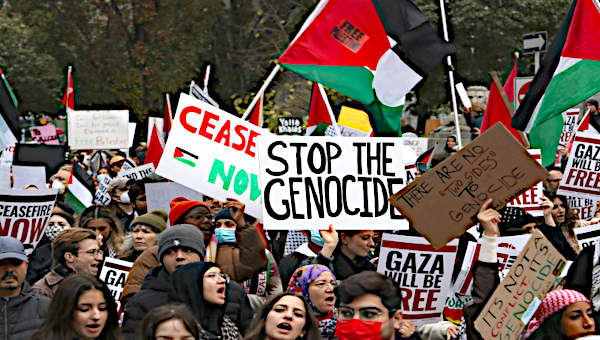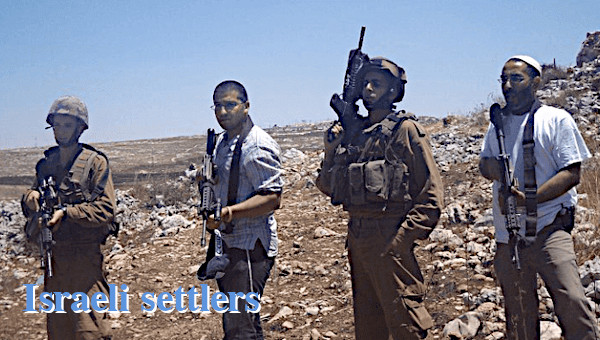BDS@20: Resilience, Resistance, and Regeneration
In the current most depraved phase of the US-Israeli livestreamed genocide against 2.3 million Palestinians in Gaza, what Jewish Voice for Peace calls Israel’s “final solution,” we are marking the BDS movement’s 20th anniversary to affirm our collective power in isolating Israel’s 77-year-old regime of settler colonial apartheid against Indigenous Palestinians like never before.
Twenty years ago, we were told it is impossible for a movement for Palestinian rights calling for boycotts, divestment, and targeted sanctions on Israel’s regime of oppression to take off. As a statement by the Palestinian BDS National Committee (BNC), the largest Palestinian coalition leading the global BDS movement has said, July 9, 2005, “will be remembered in history as the start of a principled, strategic, and creative process that has isolated Israel’s decades-old regime of settler-colonialism, apartheid, and military occupation at the grassroots and institutional level.”
Oppressors and their propaganda machines always tell us it is impossible to aspire for freedom, justice, equality; yet with people power, with our collective, principled, creative and strategic work and agency, we make the impossible possible.
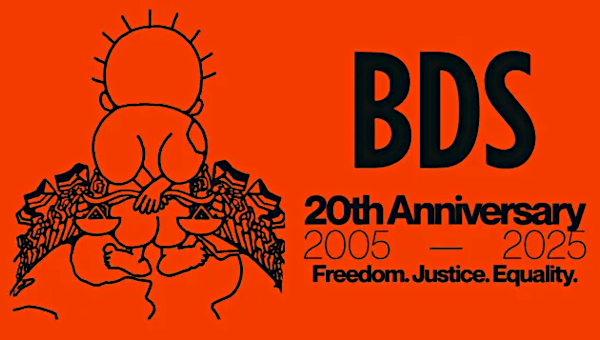
Same Old Strategy
Inducing despair is a strategy as old as Zionist settler colonialism in Palestine. As early as 1923, Zionist leader Ze’ev Jabotinsky wrote with lucid honesty:
“Every native population in the world resists colonists as long as it has the slightest hope of being able to rid itself of the danger of being colonised. […] Zionist colonisation must either stop, or else proceed regardless of the native population. Which means that it can proceed and develop only under the protection of a power that is independent of the native population – behind an iron wall, which the native population cannot breach.”
Aside from its concrete and high-tech walls surrounding Palestinian ghettos, especially Gaza, Israel has incessantly tried to construct an “iron wall” in our minds by trying to reduce us to “human animals,” to isolate us from our natural Arab environment and the rest of the world. It has desperately tried to sear into our consciousness, through sustained unspeakable colonial violence, the imperative of submission to its indomitable power as fate. Born in 2005, inspired by the struggles that ended – political – apartheid in South Africa and Jim Crow in the United States, BDS has evolved to become a hopeful, formidable antidote to this induced hopelessness. It has become a beacon of resilience, resistance, and regeneration.
As revealed recently in an investigative report in The Nation, Israel and its lobby groups in the US alone have allocated some $900-million dollars for fighting BDS over a period of few years. In fact, Israel, a nuclear power that is armed to the hilt by the US, Germany, and other colonial powers, has since 2014 designated the nonviolent BDS movement as a “strategic threat” and, later, as an “existential threat” to its regime of oppression. Though it has mobilized massive financial, intelligence, lawfare, propaganda, and diplomatic resources in its war on BDS, Israel has miserably failed to even slow down our movement, thanks to the resilience, creativity, and strategic radicalism of millions of BDS advocates, supporters, and organizers worldwide.
The BDS movement has made “do no harm” a fundamental ethical principle of global solidarity. Ending complicity in wrongdoing is not an act of charity. It is the ABCs of solidarity, and it is a fulfillment of a profound ethical obligation to do no harm.
Enabled and emboldened by the boundless complicity of fascist and authoritarian forces in the US and elsewhere in the colonial west, Israel is trying to numb our consciences with its relentless savagery, to exterminate the survivors of its ongoing Nakba, not gradually as it has been doing for decades, but in one fell swoop. Eliminating the natives, after all, is a consistent and fundamental feature, not a bug, in settler colonial history, as native Americans know all too well.
In this darkest of moments, BDS helps to decolonize our minds from the powerlessness and hopelessness with which Israel and its colonial partners relentlessly attempt to colonize them.
Despite Israel’s – and the Zionist movement’s – well-oiled propaganda, intimidation, bullying, and deep influence on corrupt politicians and on genocidal corporations and media outlets, BDS has had an irrefutable impact.
Impact of BDS
For instance, universities worldwide, particularly in Europe, North America, Latin America, and Africa have cut academic and/or financial ties with Israel and its complicit institutions.
Norway’s sovereign fund – the world’s largest – as well as the United Methodist Church and the Presbyterian Church USA have divested from Israel Bonds and other complicit investments.
Tens of thousands of cultural workers, and most recently over seven thousand writers and publishers, have endorsed the cultural boycott of Israel.
Governments in the Global South, like Colombia, have enacted trade sanctions, energy embargoes, and/or military embargoes.
BDS has also played a key role in Intel’s decision to scrap a $25-billion investment in Israel and to accelerate Israel’s descent into what we call a #ShutDownNation. In fact, the Chairman of the Israel Export Institute has admitted that BDS has “changed Israel’s global trade landscape.”
With a massive global network supported by trade unions, farmers’ coalitions, as well as racial, social, gender and climate justice movements, together representing tens of millions, the BDS movement has evolved into one of the most effective and impactful justice movements in the world today.
It is based on international law, but it takes a critical view of it and strives to expand its interpretation beyond the confines initially set by its colonial founders.
BDS is opposed to all forms of racism, including anti-Palestinian, anti-Arab, anti-Muslim, anti-Black, anti-Indigenous, and anti-Jewish racism. Today, more than ever, it is absolutely crucial to reiterate that there is nothing Jewish about Israel’s military occupation, settler-colonialism, apartheid, Nazi-like starvation of millions, pushing hundreds of thousands into “concentration camps,” or genocide. Therefore, there is nothing anti-Jewish in advocating for BDS against Israel’s regime of colonial oppression and against corporations and institutions that are complicit in maintaining it.
Angela Davis has recently said, “Palestine is really the center of the world” today. When activists around the world chant in their millions, “Palestine frees us all,” they are engaging in empowering defiance, in speaking truth to political and corporate power, in what we call “strategic radicalism” that the Palestine solidarity movement, and BDS at its core, has inspired among diverse justice movements worldwide, just as the South African anti-apartheid movement did in the 1980s.
An entire young generation today across the world accurately perceives of Gaza as not just a scene of destruction of tens of thousands of Palestinian lives and a 4,000-year-old civilization, carried out with unparalleled brutality and impunity at the hands of a US-Israeli genocidal axis, but also, simultaneously, as emblematic of a dystopian era of might-makes-right that poses a threat to humanity at large, a threat as fatal as the climate calamity.
Palestinians do not need or ask for sloganeering. The absolute majority of Palestinian society, in historic Palestine and in exile, as represented in the Palestinian BDS National Committee, has asked people of conscience worldwide and the global solidarity movement for two simple demands:
- Respect the comprehensive rights of the Palestinian people under international law, especially the right of refugees to return and receive reparations; and
- End all forms of complicity in Israel’s atrocity crimes and human rights violations.
To end, some of you may say: “We have genocide fatigue and are losing hope.”
Remember that Palestinians do not have the luxury of genocide fatigue or of giving up hope!
Also, as British-Pakistani writer Nadeem Aslam says: “Despair has to be earned. I personally have not done all I can to change things. I haven’t yet earned the right to despair.”
For a century, the Palestinian people have been resisting colonial oppression and never given up. We insist on our “full menu of rights,” as Archbishop Desmond Tutu once put it. We strive to thrive in our homeland in freedom, justice, equality, and unmitigated dignity. Do not fall into complacency until you have ended US complicity in Israel’s crimes. Do not give up hope. You have not earned it yet. •
This article first published on the BDS Movement website. Remarks by Omar Barghouti. See also bdscoalition.ca.



